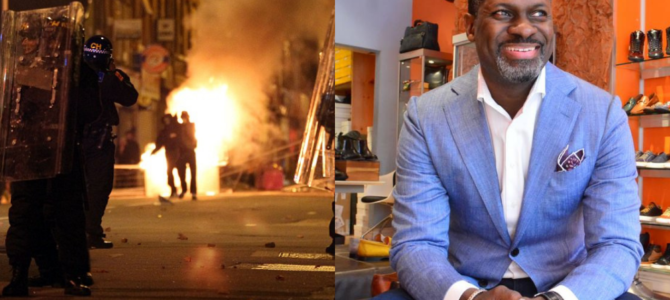
PHILADELPHIA, P.A. — A men’s shoes and accessories store in Center City, Philadelphia was looted last summer during the Black Lives Matter riots. Owner Steve Jamison, a black man who started Blue Sole Shoes in 2007, did not see it coming.
“I just thought that Philly was different,” he told me. “I thought we would respond in a different way.”
Jamison was at home when people first broke into his store on May 31. His alarm company called him to inform him of a breach. He watched on his surveillance cameras as the front door was broken down.
“It’s just a shock. It’s anger. Fear. You know, worried, concerned,” he said. “All those things came into my mind. It’s my store. It’s my business — my livelihood. And all that came into play. Those are the things I thought about.”
Unlike some other businesses that were cleaned out of all inventory — or even burned down — everything in Blue Sole Shoes was not robbed. The business was targeted early in the evening before the city got completely out of control. Yet products were stolen, and vandalism and damage incurred.
There was not one coordinated group but a random collection of individuals weaving in and out of his store as they looted, Jamison says. Jamison does not remember how many pairs of shoes were grabbed because he says he has moved on “mentally” and “emotionally.”
One would imagine that a business owner would have been terrified to step foot in his store the same day it was getting terrorized. Indeed, other owners who spoke to The Federalist waited days before returning.
But Jamison went back the night of. He got to the store and watched the activity on the street. Looters were trying to come into Blue Sole Shoes and he kept telling them it is a black-owned business.
Throughout the country, this became a trend. Black and Latino business owners taped signs to their store’s windows. “African owned business,” read signs written in Minneapolis, Minnesota, “We support our small diverse and minority businesses.”
Saving his store was vital to his livelihood. Jamison opened Blue Sole Shoes in February 2007 after saving up. His venture was financed with a $120,000 home equity loan and with credit. He knew he would lose his house if the business failed.
After the looting, it was a mess in the store. In the days that followed the break-in, the cleaning began. “Merchandise was just kind of thrown around,” Jamison tells me. “It was just a lot of disarray. It was messiness.”
The door and windows had been boarded up. For days, the violence in Philadelphia continued. Trash heaps were everywhere, graffiti scrawled on buildings and stores, glass shattered in the streets. Some individuals let off fireworks over burning police cars in front of City Hall. The curfew went unobserved.
I asked Jamison what sort of financial strain the looting of his store put him under. He was not sure about the numbers and mentioned that coronavirus lockdowns made matters worse. The store was closed for three months and then some due to the violence — just after Democrat Gov. Tom Wolf announced reopening guidelines.
“I mean, I don’t remember,” he said about damages. “The looting was just in addition to the shutdowns. I really look at it as a whole package kind of thing. Because literally, it came at the end of what were supposed to be the shutdowns — the city had announced we will be allowed to reopen. And then it happened. You know, you couldn’t open because of the looting and the riots.”
The shop owner was more guarded on condemning the movement last summer. He says he has “experienced injustice” and “sometimes hopelessness comes about.” Jamison noted that opportunists participated in the looting.
Kathy Barnette, who is running in Pennsylvania to become the first black Republican female elected to the U.S. Senate, is far more critical of the BLM movement. She told me the BLM movement is “Marxist” and that it is trying to “overthrow the country.”
“The goal of Marxism is to create agitation and divide you and then control you,” Barnette said in an interview. “It overturns the country. What we saw on the streets was very destructive and destroyed lives and murdered lives. There is no pot of gold at the end of this rainbow.”
Blue Sole Shoes opened its doors back up in September. Along with two other nearby stores, there was a triple ribbon-cutting ceremony. There are no more wooden boards, there is new glass, and the shelves were restocked.
Asked about how business has been a year after the summer of rage, Jamison said it is going well.
“It’s been busy lately. So, you know, we’re grateful for that,” he said. “It’s kind of where I’ve placed myself in the hope that I can grow from the point of reopening. It wasn’t like a faucet that turned on — like you open the doors and had a flood of people coming in to buy merchandise. That wasn’t the case. But there was a slow, gradual but steady, consistent increase as restrictions loosened.”
“It’s been good to just be at a good place,” he added, “a good space. Not as scary, not as unnerving.”








